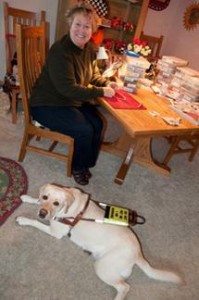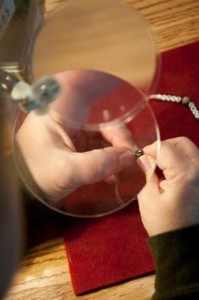Independent Woman
- Share
- Tweet
- Pin
- Share

Photo by Dan Eggert.
Patti Ligman of Sturgeon Bay says she owes her life to a dog named Zeus. It’s not a rescued-from-a-burning-building or a saved-from-drowning tale of canine heroism, but a life-changing story all the same.
Ligman’s mother went blind from a hereditary disease when she was 50. Ironically, when Ligman lost the vision in her right eye at 25, it was not from genetic causes, but from histoplasmosis, a rare lung infection that had been lurking undiagnosed since she picked up the germs as a child, gathering eggs in her grandmother’s chicken coop.
Ligman and her husband, Joe, lived on a farm, and she ran a gift shop in the little caboose parked near Sturgeon Bay’s old railroad station. She learned to quilt, and it became a passion. Life went on. But, after lying fallow for nearly 30 years, the disease reappeared in her good eye. “It was,” Ligman says, “a bit of a shock. I was really down. I figured this was the end – not at all what I’d planned for my golden years.”
That’s when Dr. Eric Paulsen, her “angel,” called the Wisconsin Office for the Blind and Visually Impaired and said he had a patient who needed help.
“When Susan Dachelet from that office called me, I almost hung up on her,” Ligman says. “I thought she wanted to sell me light bulbs. But Susan was persistent. She got me going with rehab and convinced me to try beading to occupy my time.”
In 2000, Susan encouraged Ligman to go to Northcentral Technical College in Wausau that had a center for students with disabilities.
“I was terrified,” Ligman says. “I was suddenly afraid of everything, because I could no longer see clearly. But I started to learn Braille and mobility – how to walk with a white cane, sense the difference between gravel and pavement and to depend more upon my ears.”
An instructor at the center greeted Ligman by name every morning and moved freely through the halls. She was amazed to find he was totally blind.
When Ligman returned home, Susan began pushing her to attend a session of the Wisconsin Lions Camp for blind and visually impaired adults. “I remembered Girl Scout Camp,” Ligman says, “burned food, crabby counselors, sand in my underpants and mosquitoes. I DID NOT WANT TO GO!”
But she went, sobbing the two-and-a-half hours it took her husband to drive her to Rosholt, WI.
“I told Joe that when he got home, he was going to find a phone message to turn right around and come back to get me,” Ligman says. “As he was walking me to the administration building to check in, I saw people with white canes and guide dogs, and I cried even harder. ‘I don’t want to be one of them,’ I said. And Joe said, ‘You already are.’”
“The first night, I didn’t even speak to my 10 cabin mates. They all seemed to know one another and were laughing and having a great time. I didn’t know how they could think being here was fun. I thought it was awful. The ringleader of the group was a boisterous woman named Cookie, who had a dog named Zeus. In the middle of the night, I woke up to a very strange feeling – not uncomfortable, but weird. I yelped, the counselor turned on the lights and everyone roared. Zeus had crawled onto my bed and was licking my feet. That dog was the beginning of my new life.”
Ligman started making friends. By the end of the second day, she’d asked the camp director if she could stay an extra week. She’d brought her beading supplies with her and began making bracelets for the counselors. Before the week ended, she was asked to make items to sell in the trading post. A plaque with her picture and the words, ”She didn’t want to come to camp, and now we can’t get rid of her!” hangs above her display. Ligman’s returned to camp every year except one.
“Lions Camp is an amazing experience,” she says.
There she went hiking, canoeing, played musical instruments, even participated in blind archery. More importantly, she says, “You’re picking up little tricks of the trade, compassion and how to laugh at yourself. I learned to view blindness as more of an inconvenience than a disability. I was still a wife, responsible for cooking, cleaning, shopping and laundry. I was very fortunate to have a husband who didn’t wrap me in cotton batting, but allowed me to do everything I thought I could and helped if I failed.”
Ligman has no central vision in her right eye, and her left she describes as “looking through a colander with most of the holes plugged.” On a very bright day, she may be able to see a quarter on the ground, if it’s in just the right spot, and two minutes later walk into a post.
In September 2006, she decided to apply for a dog to make her more independent. The Leader Dogs for the Blind in Rochester Hills, MI, is one of the few programs that provide dogs for legally blind persons with partial sight. But that September, her husband Joe was diagnosed with the brain disease that would take his life in December of 2009. She almost didn’t get the dog, because she didn’t want to leave Joe for a month for training. But, knowing she was going to be alone, she went in May of 2007 and was introduced to Lily, her new Leader Dog.
Lily guides her up stairs and around obstacles, walking everywhere with Ligman. Twice Lily has sensed some danger that Ligman was not aware of and stopped diagonally in front of her to block the way until Lily felt it was safe to proceed.
When Ligman began to lose the sight in her good eye, people were full of advice about the things she should no longer do. She didn’t listen. She sails, kayaks, swims, rides a tandem bike, climbs rock walls, goes to the movies (one of the few places Lily doesn’t go; too much popcorn on the floor), is a member of a book club, the Red Hatters and Altrusa, a women’s service organization. She hopes to run with Lily in a marathon.
“I’ll give anything a whirl,” she says.
Ligman says that Dr. Paulsen is an incredible man, her first line of defense.
“He saw beyond the disability and recognized me as a living, thriving person in the community,” she says. Of the six doctors who have treated her, Paulsen is the only one who told her about the resources available, like the Lions Camp and the Sharper Vision Store operated by the Wisconsin Council of the Blind and Visually Handicapped.
Ligman is a very vocal ambassador for the work the Lions Club does to help the visually impaired. It was at that first camp where Zeus licked her feet that Ligman decided she would not give up, but would continue to live a full life.
“There used to be a local support group for the visually impaired, but it was discontinued,” she says. “That’s one of the reasons I like to talk to school groups. If I show youngsters what I’m able to do, maybe they’ll go home and tell grandma or great-grandpa there are resources available for them, too.”

